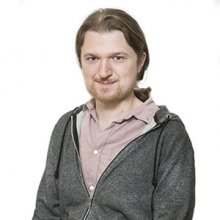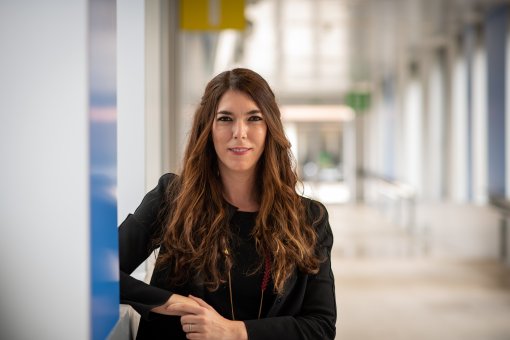Images
Participants

Contact

Croatian scientist Fran Supek is launching his Genome Data Science (aGENDAS) laboratory.
aGENDAS is starting this April and will promote the research in Big Data, an strategic area also for the Barcelona Institute of Science and Technology (BIST).
With this new group, the Institute now hosts 24 laboratories and seven core facilities.
Researcher in the field of bioinformatics and genomics Fran Supek (b. Zagreb, Croatia, 1981) is starting his Genome Data Science (aGENDAS) laboratory at IRB Barcelona, within the Structural and Computational Biology Research Programme. His group aims to tackle important biological questions by insightful statistical analysis of massive data sets originating from human cancer, human populations, environmental DNA sequencing (metagenomics), and also fully sequenced microbial genomes. The recruitment of Supek also fits into the Big Data strategic research area that the Barcelona Institute of Science and Technology (BIST), in which IRB Barcelona is included, will be promoting over the next few years.
The aGENDAS research group will investigate biological mechanisms behind various mutational processes that shape genomes of humans and other organisms during evolution. In particular, one important disease that is caused by mutations in DNA is cancer. Such mutations may also highlight potential therapeutic opportunities. Supek’s group, which will initially include four members, will use cutting-edge artificial intelligence methods to understand what causes mutations in human DNA, which parts of the genome are affected, and will also try to detect tumour vulnerabilities that may open new avenues for personalized treatment.
“While one can easily recognize the mutational signatures produced by, for example, cigarette smoke in lung cancer and sunlight in melanoma, recent analyses of cancer genomes suggest there are many other factors causing mutations in our cells. In most cases, we don’t yet know exactly what causes a certain kind of mutation in DNA. Some mutations result from failures in the processes that the tumour cells use to repair their DNA, thereby causing the cancer to mutate faster and to become more aggressive and resistant to drugs. However, the failed DNA repair is also a weakness of the tumour, which may be exploited to destroy it, while sparing healthy cells,” highlights Fran Supek.
This group’s expertise in machine learning algorithms will allow aGENDAS researchers to reveal patterns in very large, complex, noisy and often incomplete databases derived from human genomes and epigenomes. Machine learning can provide unique approaches for discovering the intricate mechanisms of how the integrity of DNA is maintained in human cells. This includes the resilience to mutations in somatic cells, which make up various human tissues, but also in germline cells, where mutations are passed down to offspring, thus being a potential cause of familial diseases and other heritable phenotypes.
Fran Supek’s Career
Fran Supek holds a PhD degree in Molecular Biology from the University of Zagreb (Croatia). He arrived in Barcelona in 2010 to take up a postdoctoral position in the EMBL/CRG Systems Biology Unit at the Centre for Genomic Regulation (CRG). There he studied the genomes of human tumours in Dr. Ben Lehner’s “Genetic systems” laboratory. Their work has provided novel insight into how human cells protect important regions of the genome from mutations, how some of these mutations may cause tumours even if they appear to be ‘silent’, and how the cells’ quality control mechanisms deal with messages produced from mutated genes.
Supek’s research has resulted in 29 scientific publications—in 18 he appears as first or corresponding author—including prestigious journals such as Cell, Nature and Nature Genetics. He is the co-inventor of a patent and participated in the creation of the spin-off company BioZyne in 2004. In 2016, Fran Supek has received the highly competitive Ramón y Cajal fellowship awarded by the Spanish Ministry of Economy and Competitiveness (MINECO).
IRB Barcelona's commitment to promoting scientific talent
The recruitment of Supek is a clear demonstration of IRB Barcelona's commitment to recruiting highly promising scientific talent and to offering leadership opportunities to young investigators. "The scientific environment that IRB Barcelona offers is highly stimulating and a very good fit for my research plans. My impression is that it is an excellent institution for a starting principal investigator to develop their career and to deliver world-class research. I hope that my work will complement the Institute's other lines of biomedical investigation," stresses Fran Supek.
With the addition of this new group, the IRB Barcelona now comprises a total of 24 laboratories and seven core facilities.
About IRB Barcelona
Created in 2005 by the Generalitat de Catalunya (Government of Catalonia) and University of Barcelona, IRB Barcelona is a Severo Ochoa Centre of Excellence, a seal that was awarded in 2011. The institute is devoted to conducting research of excellence in biomedicine and to transferring results to clinical practice, thus improving people’s quality of life, while simultaneously promoting the training of outstanding researchers, technology transfer, and public communication of science. Its 24 laboratories and seven core facilities address basic questions in biology and are orientated to diseases such as cancer, metastasis, Alzheimer’s, diabetes, and rare conditions. IRB Barcelona is an international centre that hosts more than 400 employees and 36 nationalities. It is located in the Barcelona Science Park. IRB Barcelona forms part of the Barcelona Institute of Science and Technology (BIST) and the “Xarxa de Centres de Recerca de Catalunya” (CERCA).
About IRB Barcelona
The Institute for Research in Biomedicine (IRB Barcelona) pursues a society free of disease. To this end, it conducts multidisciplinary research of excellence to cure cancer and other diseases linked to ageing. It establishes technology transfer agreements with the pharmaceutical industry and major hospitals to bring research results closer to society, and organises a range of science outreach activities to engage the public in an open dialogue. IRB Barcelona is an international centre that hosts 400 researchers and more than 30 nationalities. Recognised as a Severo Ochoa Centre of Excellence since 2011, IRB Barcelona is a CERCA centre and member of the Barcelona Institute of Science and Technology (BIST).




